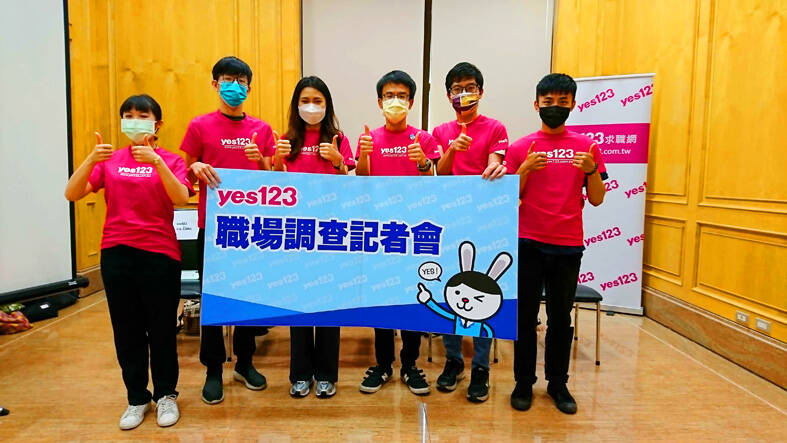The number of university students who plan to seek part-time work during the summer semester has reached an all-time high, a poll released by online job bank yes123 showed yesterday.
The poll showed that 91.2 percent of college students said they have plans to get a part-time job during the upcoming semester, up from 90.1 percent for the same period last year.
About 60 percent of respondents who said they would seek work were open to having two part-time jobs, the poll showed.

Photo courtesy of yes123
Respondents planned to spend at most 64.2 hours working per month, or two hours per day, while about 10 percent planned to work 100 hours or more per month, yes123 said.
Respondents hoped to make NT$23,596 per month on average, with 5.7 percent hoping to make more than NT$50,000, it said.
The poll found that 97.6 percent of college students have already worked while studying, with their average monthly income being NT$20,929.
However, 10.9 percent said they made less than NT$10,000 monthly, the job bank said.
More than 72.3 percent were unhappy with their pay, with only 27.7 percent satisfied, it said.
Despite the high rates of working part-time, 70 percent of respondents said the money they made “was still insufficient,” with 47.3 percent saying they had to rely on their families, and 23.6 percent saying they had to borrow from friends, classmates or even teachers, it said.
Yes123 said that 33.6 percent reported that employers had not paid their labor insurance, while 44.3 percent had been paid less than the minimum wage.
Yes123 spokesman Yang Tsung-pin (楊宗斌) said that students who do part-time work, including tutoring, should look out for traps such as unreasonable wage deductions or being asked to pay out-of-pocket for company goods.
Students must speak up if they are not paid at least minimum wage or if employers do not pay their labor insurance, Yang said, adding that the authorities should be contacted if employers fail to respond to their requests.
The poll was conducted online from Aug. 10 to 23, targeting college students. It garnered 1,218 valid responses and had a margin of error of 2.81 percentage points.

Beijing could eventually see a full amphibious invasion of Taiwan as the only "prudent" way to bring about unification, the US Department of Defense said in a newly released annual report to Congress. The Pentagon's "Annual Report to Congress: Military and Security Developments Involving the People's Republic of China 2025," was in many ways similar to last year’s report but reorganized the analysis of the options China has to take over Taiwan. Generally, according to the report, Chinese leaders view the People's Liberation Army's (PLA) capabilities for a Taiwan campaign as improving, but they remain uncertain about its readiness to successfully seize

Taiwan is getting a day off on Christmas for the first time in 25 years. The change comes after opposition parties passed a law earlier this year to add or restore five public holidays, including Constitution Day, which falls on today, Dec. 25. The day marks the 1947 adoption of the constitution of the Republic of China, as the government in Taipei is formally known. Back then the Chinese Nationalist Party (KMT) governed China from Nanjing. When the KMT, now an opposition party in Taiwan, passed the legislation on holidays, it said that they would help “commemorate the history of national development.” That

Taiwan has overtaken South Korea this year in per capita income for the first time in 23 years, IMF data showed. Per capita income is a nation’s GDP divided by the total population, used to compare average wealth levels across countries. Taiwan also beat Japan this year on per capita income, after surpassing it for the first time last year, US magazine Newsweek reported yesterday. Across Asia, Taiwan ranked fourth for per capita income at US$37,827 this year due to sustained economic growth, the report said. In the top three spots were Singapore, Macau and Hong Kong, it said. South

Snow fell on Yushan (Jade Mountain, 玉山) yesterday morning as a continental cold air mass sent temperatures below freezing on Taiwan’s tallest peak, the Central Weather Administration (CWA) said. Snowflakes were seen on Yushan’s north peak from 6:28am to 6:38am, but they did not fully cover the ground and no accumulation was recorded, the CWA said. As of 7:42am, the lowest temperature recorded across Taiwan was minus-5.5°C at Yushan’s Fengkou observatory and minus-4.7°C at the Yushan observatory, CWA data showed. On Hehuanshan (合歡山) in Nantou County, a low of 1.3°C was recorded at 6:39pm, when ice pellets fell at Songsyue Lodge (松雪樓), a